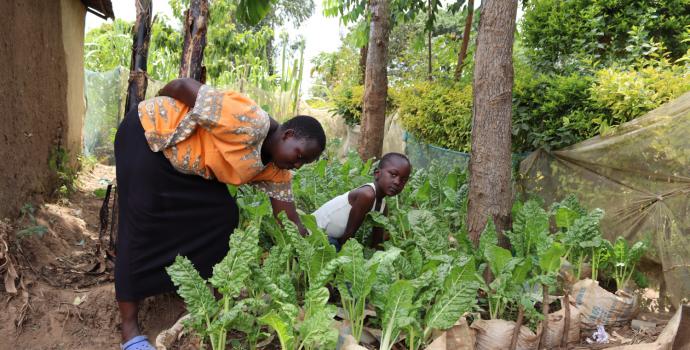SECTOR-WISE NUTRITION CHAMPIONS ADVOCATE FOR IMPROVED FOOD SECURITY IN KAKAMEGA COUNTY, KENYA

Esther Kaleya, a community member mentored by nutrition champion Eric Miheso, established a kitchen garden using cement bags. Photo credit|Fridah Bwari, Save the Children
By Chief of Party Peter Milo, Technical Coordinator Catherine Moraira and Communications Officer Fridah Bwari, USAID Advancing Nutrition
One out of three households in Kakamega County, Kenya, is food insecure.
“There is a belief in some communities that women cannot own land and do not have authority over what crops should be grown on it and the fact that few young people do not see a future for themselves in agriculture” said Mary Shimwenyi, who leads Shimashiki, a local organization advocating for women’s land ownership rights and youth empowerment, is trying to change this.
With training from USAID Advancing Nutrition, Mary is now a nutrition champion, also known as a sector-wise nutrition champion, in the agriculture and livestock sector. Partnering with the county government and local community-based organizations (CBOs) like Shimashiki, USAID Advancing Nutrition has trained 61 nutrition champions who raise awareness about the importance of nutrition and participate in integrated county activities that enhance household food security. Even the former and current First Ladies of Kakamega County, Mrs. Priscilla Oparanya and Prof. Janet Barasa, have joined in the action and signed up to become champions.
Mary helps educate people in her community to encourage keeping of animals, growing fruits and vegetables to improve nutritional outcomes. Each week, Shimashiki members meet to discuss nutrition, food production, diversified diets, food preparation, handling and storage. The organization visits members on their farms and empowers youth with information on farming techniques and nutrition for the family. Mary explains that it is important to discourage members from selling off their land inheritance, and she encourages young men to engage in agricultural production rather than the popular boda boda (motorcycle) business.
Shimashiki has successfully helped women keep their property in land ownership cases. Zibretah Atamba, a mother and grandmother who was living with her family on their ancestral land, almost lost her farm when her husband, who held the land title and disposed of the property covertly, giving instructions to demolish the houses and evict his wife.
Shimashiki, in collaboration with the Federation of Women Lawyers in Kenya, initiated a legal process, and Zibretah got her land back. She learned about dietary diversification from the CBO and now grows local foods and vegetables for home consumption and sale. Zibretah is proud to provide for her grandchildren and feed them healthy foods.
In the nearby village of Musoli, Eric Miheso, another nutrition champion, attended nutrition-sensitive agriculture trainings supported by USAID Advancing Nutrition and the Ministry of Agriculture. After the training, he established a model farm where community members can learn about these farming techniques. Eric has planted fruit trees like avocado, different types of vegetables, and herbs, and his mushroom farm is thriving.
On average, he hosts three groups of visitors per week—mostly from schools, colleges, and CBOs—who come for demonstrations. Eric believes it is possible to reduce malnutrition in Kakamega County if the youth embrace agriculture as a source of income, and if training in sustainable agricultural techniques is scaled up.
Through the sector-wise nutrition champions approach, individuals and communities are gaining knowledge and skills in sustainable farming, giving them the means to fight malnutrition and improve livelihoods where they live. According to the Kenya Demographic and Health Survey 2022, Kakamega County reduced stunting rates from 28 percent in 2014 to 12 percent in 2022 mainly attributed to collaborative efforts by the county government and non-state actors to address the underlying causes of malnutrition in the county.
Likewise, through the continuous advocacy efforts by the champions on proper use of land for agricultural farming, increased resources for nutrition interventions and, farmers’ trainings on nutrition-sensitive agriculture and technologies, will increase food production and reduce food insecurity that can lead to malnutrition.
USAID Advancing Nutrition works across sectors, engaging agriculture, water, health, education, and social protection ministries, as well as local government. The project strengthens government capacity to plan, finance, manage, and implement multi-sectoral nutrition interventions that improve the health of populations at risk of nutritional deficiencies. In Kenya, it operates in Kakamega, Kisumu, Kitui counties and at national level with the Ministries of Health and Agriculture.